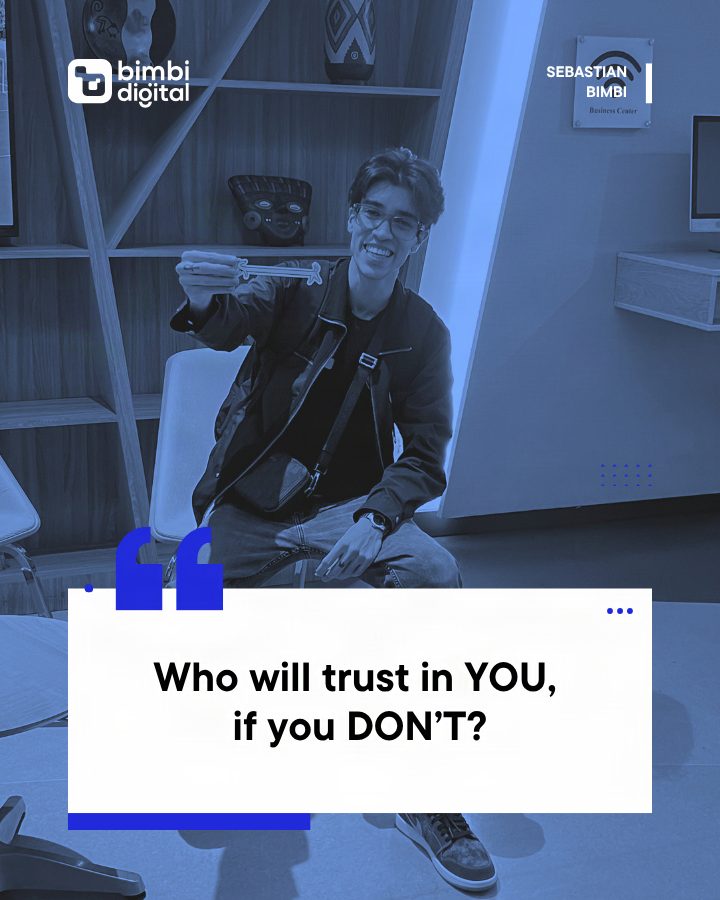Who Will Trust in You, If You Don't?

The hardest sale you'll ever make isn't to a client, an employer, or even your audience.
It's to yourself.
I've seen incredibly talented developers, designers, and creators sabotage their own success—not because they lacked skills, but because they didn't believe in their own value.
Here's the truth that changed everything for me: Nobody will trust you until you trust yourself first.
The Confidence Paradox
Early in my career, I had the technical skills. I could build complex Webflow sites, solve problems, and deliver results. But when clients asked about pricing or scope, I'd immediately doubt myself:
- "Maybe I'm charging too much..."
- "They could probably find someone better..."
- "What if I can't deliver what I promised?"
That internal doubt leaked into everything:
- My proposals sounded apologetic
- My pricing was too low
- My communication lacked certainty
- My posture screamed "I'm not sure about this"
Clients could sense it. And if I didn't believe in my value, why would they?
Self-Trust is the Foundation
Think about the people you trust most in your professional life. What do they have in common?
Certainty.
They're not arrogant. They're not overconfident. But they have a quiet assurance that says: "I know what I'm doing, and I've got this."
That certainty doesn't come from being perfect. It comes from trusting yourself to figure things out, even when you don't have all the answers.
The Shift I Made:
Instead of asking:
- "Am I good enough?"
I started asking:
- "Can I solve this problem?"
- "Can I learn what I don't know?"
- "Can I deliver value?"
The answer was always yes. And that's where self-trust begins.
Why Self-Doubt Kills Opportunities
Here's what happens when you don't trust yourself:
1. You Undercharge
"I'm not experienced enough to charge that much..."
Translation: You don't trust your value. So you discount it before the client even gets a chance to see it.
2. You Over-Deliver to Compensate
You throw in extra features, extra revisions, extra hours—all for free—because you're trying to prove you're worth the (already too-low) price.
3. You Avoid Visibility
You don't post online, speak up in meetings, or share your work. Because what if people see you're not as good as they think?
4. You Say Yes to Everything
Even projects that aren't aligned, don't excite you, or pay poorly. Because you don't trust that better opportunities will come.
The result? Burnout, resentment, and a business (or career) that feels like survival instead of success.
Building Self-Trust: A Framework
Self-trust isn't something you're born with. It's built through intentional action.
1. Keep Your Promises to Yourself
Self-trust starts small. If you tell yourself you'll:
- Post on LinkedIn 3x this week
- Finish that side project by Friday
- Wake up at 6am tomorrow
Do it.
Every time you keep a promise to yourself, you build evidence that you're reliable. Every time you break one, you erode that trust.
2. Collect Evidence of Your Competence
Your brain focuses on failures by default. It's wired for survival, not confidence.
Fight back with data:
- Keep a "wins folder" of client testimonials, successful projects, and positive feedback
- Track problems you've solved
- Document skills you've learned
- Review this evidence when imposter syndrome hits
You're not making stuff up. You're reminding yourself of reality.
3. Reframe "I Don't Know" as "I'll Figure It Out"
When a client asks for something you've never done before, the self-doubt voice says: "I can't do that."
The self-trust voice says: "I haven't done that yet, but I can figure it out."
That shift is everything.
I've taken on projects where I knew maybe 60% of what I needed to know. The other 40%? I learned along the way. And I trusted myself to do it.
4. Stop Comparing, Start Competing with Yesterday's You
There will always be someone:
- More skilled
- More experienced
- Further along in their journey
That's irrelevant.
The only comparison that matters: Are you better than you were 6 months ago?
If yes, you're winning.
5. Talk to Yourself Like You'd Talk to a Friend
If your friend came to you with the same doubts you have, what would you say?
"You're not good enough"?
No.
You'd say: "Look at how far you've come. You've solved harder problems than this. You've got this."
Give yourself that same grace.
The Ripple Effect of Self-Trust
When I finally started trusting myself, everything shifted:
In Client Relationships:
- I stopped apologizing for my rates
- I set boundaries without guilt
- I communicated with clarity instead of hedging
In My Content:
- I stopped second-guessing every post
- I shared my opinions without fear
- I showed up consistently because I trusted my value
In Opportunities:
- I said no to misaligned projects
- I applied for things I "wasn't qualified for"
- I took risks that paid off
The external trust followed the internal trust.
The Trust Cycle
Here's the beautiful part:
Self-trust → External trust → More opportunities → More evidence → Stronger self-trust
It's a cycle. But you have to start it.
And it starts with you believing—truly believing—that you are:
- Capable of learning what you don't know
- Worthy of the success you want
- Able to figure things out along the way
The Question That Changes Everything
When you're about to:
- Send a proposal
- Post content
- Pitch an idea
- Take on a challenge
Ask yourself:
"If I trusted myself completely in this moment, what would I do?"
Then do that.
Final Thought
Nobody will hand you confidence. Nobody will give you permission to trust yourself.
You have to claim it.
Not because you're perfect. Not because you know everything. But because you're committed to showing up, learning, and growing—no matter what.
Who will trust in you, if you don't?
The answer is no one.
So start there. Trust yourself first. Everything else will follow.
Building self-confidence is a journey, and I'm still on it. If this resonated, let's connect on LinkedIn or TikTok.
